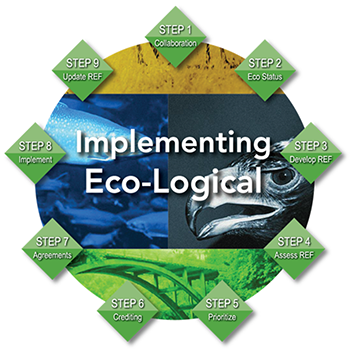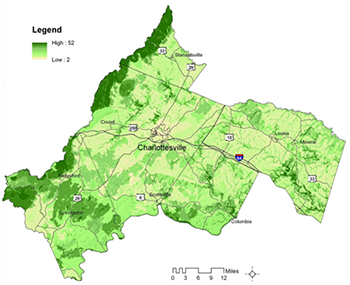
Transportation Agencies Demonstrate
How to Implement the Eco-Logical Approach
Thirty-five transportation agencies across the country have engaged in the Eco-Logical approach to promote environmentally responsible and cost-effective infrastructure development. In addition, more than 400 representatives from transportation, resource, and regulatory agencies have participated in Eco-Logical technical assistance workshops, peer exchanges, training sessions, and on-site demonstrations to learn and share information about Eco-Logical. To share best practices, the Federal Highway Administration (FHWA) has produced case studies from two transportation agencies that have successfully implemented various steps of the Eco-Logical approach and compiled key lessons learned from a recent Implementing Eco-logical Implementation Assistance Program (IAP) peer exchange. FHWA strives to continuously provide new resources to help transportation agencies with their own Eco-Logical activities.

The IEF presents nine steps for agencies using the Eco-Logical approach. (Courtesy of FHWA).
What Is “Implementing Eco-Logical?”
Implementing Eco-Logical involves the Integrated Eco-Logical Framework (IEF), a nine-step framework that helps agencies identify ecological priorities within a region. The IEF is intended to improve environmental outcomes for infrastructure projects and minimize the time and costs associated with planning and regulatory decisionmaking. To further advance use of Eco-Logical, FHWA launched its Eco-Logical Grant Program in 2006 and continues to provide support for agencies implementing Eco-Logical through the Second Strategic Highway Research Program (SHRP2) Implementing Eco-Logical (C06) initiative, in partnership with the American Association of State Highway and Transportation Officials (AASHTO). In 2013, the Implementing Eco-Logical IAP provided approximately $1.9 million in SHRP2 funding for 14 projects led by 13 State Department of Transportation (DOT) and Metropolitan Planning Organization (MPO) recipients.
How Have Agencies Applied the Eco-Logical Approach?
FHWA recently completed two case studies to demonstrate how transportation agencies are applying the IEF steps and serve as “how-to” guides:
Best Practices from CA MPO’s Eco-Logical Activities
The Charlottesville, Virginia area faces the challenge of balancing rapid development with the preservation of natural resources. CA-MPO and its parent organization, the Thomas Jefferson Planning District Commission (TJPDC), applied steps 1-4 of the IEF to the Free Bridge Area Congestion Relief Project, which seeks to alleviate congestion issues on the US-250 crossing at the Rivanna River. Major accomplishments of CA-MPO’s Eco-Logical activities include:

TJPDC’s REF provides a holistic overview of important natural resources in the five-county region. Darker green shades indicate areas of higher ecological value. (Image courtesy of TJPDC).
Using the Eco-Logical approach allowed the CA-MPO to increase stakeholder awareness of the transportation planning process and develop a consensus on two transportation alternatives at the planning phase to advance further study.
Learning from CDOT’s Implementing Eco-Logical Project
CDOT used steps 7-9 of the IEF to guide mitigation projects and wildlife connectivity along the 144-mile Interstate 70 (I-70) Mountain Corridor in Colorado. CDOT faced the challenge of improving mobility and safety on the I-70 Mountain Corridor, while enhancing habitat connectivity, improving watershed quality, and respecting community values. While CDOT has long focused on the I-70 Corridor, the Eco-Logical grant project helped the agency formalize its commitment and realize significant time savings during the environmental review process.

The I-70 Mountain Corridor connects metro Denver to Glenwood Springs. (Image courtesy of CDOT).
Major accomplishments of CDOT’s Eco-Logical grant project include:
What Have Organizations Gained from “Implementing Eco-Logical?”
FHWA and AASHTO hosted a two-day peer exchange in Washington, D.C. in October 2015 for IAP recipients, representatives from State DOTs, and Federal resource and regulatory agency staff. During the peer exchange, Eco-Logical practitioners shared lessons they have learned from applying the Eco-Logical approach:
Form Strong Partnerships
- Leverage existing partnerships and build new ones. Strong partnerships with external stakeholders are important to effectively implementing Eco-Logical. When the Maine DOT first applied for IAP funding, the agency decided to utilize an existing relationship with the U.S. Fish and Wildlife Service (USFWS) to support the project. Today, the two agencies are working together to develop a Programmatic Biological Assessment for the endangered Atlantic salmon.
- Consider a neutral facilitator when addressing challenging issues. Neutral, third-party facilitators can help provide an open, friendly forum for stakeholder input during challenging situations or to resolve past roadblocks. CA-MPO used a neutral facilitator during stakeholder workshops held as part of its IAP project to build stakeholder engagement and awareness of Eco-Logical.
- Establish working groups or committees. In many cases, IAP recipients have established informal or formal teams, working groups, or advisory committees to share information and make technical decisions. The Michigan DOT relied on a Technical Advisory Committee to engage stakeholders and make timely decisions about IAP project boundaries, conservation priorities, and strategic actions.
Develop Standardized Methods for Data Collection and REFs
- Develop a multi-faceted approach for data collection and sharing. Good data is at the heart of Eco-Logical, whether at the local, regional, or State level. For its IAP project, the Atlanta Regional Commission created a multi-disciplinary Project Delivery Task Force, including members from the city of Atlanta, U.S. Environmental Protection Agency (EPA), and Metro Water District, which made data-sharing one of its top priorities.
- Tailor data and tools to the region’s goals, priorities, and constraints. Step 3 of the IEF involves the development of an REF, designed to help agencies identify environmentally significant areas and conservation opportunities. As part of its IAP project, the North Central Texas Council of Governments chose to refine its existing REF at a sub-watershed level (1-10 square miles) to allow for greater accuracy for local ecosystem impacts.
- Establish data-sharing agreements to standardize datasets. Agencies often collect and store data in different formats, which can make it challenging when sharing data across agencies. The Ohio-Kentucky-Indiana Regional Council of Governments standardized data across the member States by establishing formal data-sharing agreements and requesting the same information from all of the agencies to develop a regional dataset.
Connect with an Eco-Logical Champion!
- FHWA’s “champions” of the Eco-Logical approach include experts from active Eco-Logical practitioners and resource and regulatory agencies, including EPA, U.S. Army Corps of Engineers, and USFWS.
- Champions have strong knowledge of Eco-Logical and the IEF steps, and can offer organization, technical, technological, and regulatory support to practitioners.
- For more information, visit the Eco-Logical website or contact David Williams.
Where Can I Access Eco-Logical Resources?
FHWA and AASHTO continue to develop resources for agencies interested in implementing Eco-Logical, including:
- Eco-Logical Starter Kit: Provides an overview of the Implementing Eco-Logical Program, including technical assistance activities, a resource library, and contact information. (Conetnt is no longer available)
- On-Call Technical Assistance Tool: Allows agencies to request individualized guidance and support on Implementing Eco-Logical and connect with Eco-Logical champions. (content is no longer availables)
- Peer Exchanges and Workshops: Allow Eco-Logical practitioners to share information on how they are applying Eco-Logical and provide opportunities for agencies to request specialized support. FHWA and AASHTO also promote Eco-Logical at a variety of conferences and meetings.
- AASHTO’s Implementing Eco-Logical Practitioner’s Handbook (release anticipated in early 2016) will provide guidance to agencies adopting Eco-Logical using the step-by-step approach promoted by the IEF.
Contact Information
David Williams
Environmental Protection Specialist
Federal Highway Administration
Environmental Program & Policy Development Team
202-366-4074
David.Williams@dot.gov
Successes in Stewardship is a Federal Highway Administration newsletter highlighting current environmental streamlining and stewardship practices from around the country. Click here to subscribe, or call (617) 494-3539 for more information.
|

